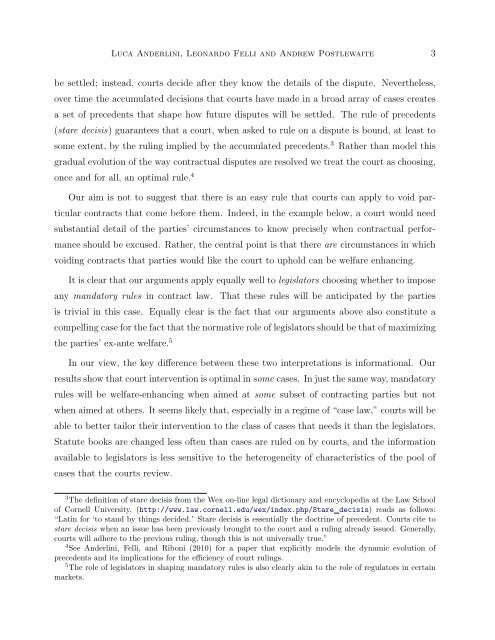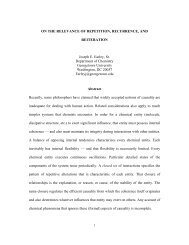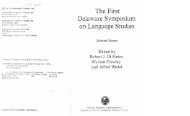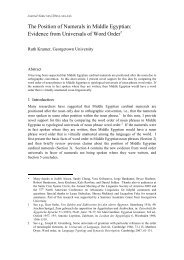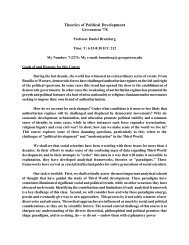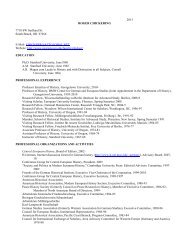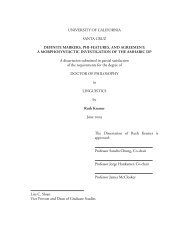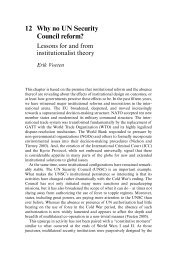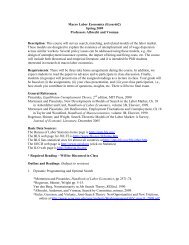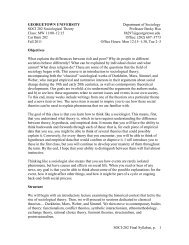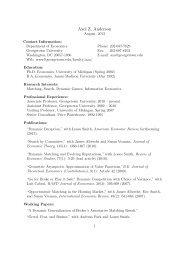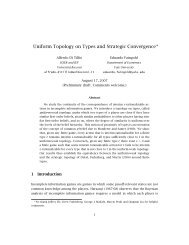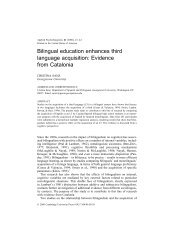PDF File - Georgetown University
PDF File - Georgetown University
PDF File - Georgetown University
Create successful ePaper yourself
Turn your PDF publications into a flip-book with our unique Google optimized e-Paper software.
Luca Anderlini, Leonardo Felli and Andrew Postlewaite 3be settled; instead, courts decide after they know the details of the dispute. Nevertheless,over time the accumulated decisions that courts have made in a broad array of cases createsa set of precedents that shape how future disputes will be settled. The rule of precedents(stare decisis) guarantees that a court, when asked to rule on a dispute is bound, at least tosome extent, by the ruling implied by the accumulated precedents. 3 Rather than model thisgradual evolution of the way contractual disputes are resolved we treat the court as choosing,once and for all, an optimal rule. 4Our aim is not to suggest that there is an easy rule that courts can apply to void particularcontracts that come before them. Indeed, in the example below, a court would needsubstantial detail of the parties’ circumstances to know precisely when contractual performanceshould be excused. Rather, the central point is that there are circumstances in whichvoiding contracts that parties would like the court to uphold can be welfare enhancing.It is clear that our arguments apply equally well to legislators choosing whether to imposeany mandatory rules in contract law. That these rules will be anticipated by the partiesis trivial in this case. Equally clear is the fact that our arguments above also constitute acompelling case for the fact that the normative role of legislators should be that of maximizingthe parties’ ex-ante welfare. 5In our view, the key difference between these two interpretations is informational. Ourresults show that court intervention is optimal in some cases. In just the same way, mandatoryrules will be welfare-enhancing when aimed at some subset of contracting parties but notwhen aimed at others. It seems likely that, especially in a regime of “case law,” courts will beable to better tailor their intervention to the class of cases that needs it than the legislators.Statute books are changed less often than cases are ruled on by courts, and the informationavailable to legislators is less sensitive to the heterogeneity of characteristics of the pool ofcases that the courts review.3 The definition of stare decisis from the Wex on-line legal dictionary and encyclopedia at the Law Schoolof Cornell <strong>University</strong>, (http://www.law.cornell.edu/wex/index.php/Stare decisis) reads as follows:“Latin for ‘to stand by things decided.’ Stare decisis is essentially the doctrine of precedent. Courts cite tostare decisis when an issue has been previously brought to the court and a ruling already issued. Generally,courts will adhere to the previous ruling, though this is not universally true.”4 See Anderlini, Felli, and Riboni (2010) for a paper that explicitly models the dynamic evolution ofprecedents and its implications for the efficiency of court rulings.5 The role of legislators in shaping mandatory rules is also clearly akin to the role of regulators in certainmarkets.


